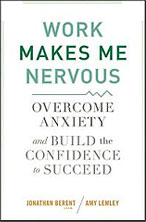About Jonathan
Jonathan has pioneered psychotherapy for social anxiety, public speaking anxiety, and performance anxiety since 1978. He has worked with thousands of individuals of all ages in individual, family, and group therapy. He is the author of “Beyond Shyness: How to Conquer Social Anxieties” (Simon & Schuster) and “Work Makes Me Nervous: Overcome Anxiety and Build the Confidence to Succeed” (John Wiley &Sons, Inc.) Jonathan is an expert in media performance having been featured extensively on television, radio, and in print. This experience includes Oprah, NBC, CBS, ABC, CNN, FOX, The New York Times, Newsday, The Chicago Tribune, and The Boston Globe.
Listen to him on WFAN SPORTS RADIO. Jonathan has extensively researched and developed clinical programs for the avoidant and dependent personality. He is a “diplomate” in clinical social work and is certified in New York State. In addition, he is certified by The Association of Applied Psychophysiology and Biofeedback.
To view Jonathan Berent’s pioneering work with Social Phobia, view the 1988 Sally Jessy Rafael Show by clicking here. To view jonathan talking about Workplace Anxiety on Long Island News Jobline, click here.
Social anxiety disorder encompasses a spectrum of problems including the selective mutism -public speaking anxiety paradigm. Social anxiety itself occurs in many degrees, and has numerous manifestations including performance anxiety, fear of public speaking, selective mutismim children, adolescents, and adults, intimacy anxiety, and school phobia. In addition, social anxiety disorder can be a gateway to avoidant and dependent personality. Social anxiety is based on performance dynamics. This is what separates it from other anxiety disorders. Anxiety is fear. When anxiety creates avoidance of the of the performance scenario a social phobia is present. While there are many examples of social anxiety, a disorder which impacts individuals of all ages and cultures, there are two basic types of individuals who have the problem; individuals with and without “initiative”. “Initiative” does not mean ability. It means “the motivation to start up”, or “to get help or resolve the problem”. In my clinical experience, which spans over 30 years and includes clinical work with social anxiety sufferers of all ages, I have seen everything from a total resolution to the problem, to the problem being permanent, and everything in between.
A crucial fact for those afflicted with social anxiety disorder, and for their loved ones, is the reality that the earlier there is productive help the more potential there is to resolve the anxiety before it becomes integrated into the personality and lifestyle. The perfect example of this is selective mutism in children, which is a profound example of social anxiety and social phobia at an early age. In addition it is a variation of obsessive compulsive disorder. Click here to listen to a free library of interviews which includes a comprehensive picture of social anxiety and social phobia.
Self-Help and Treatment Options
- Free Audio CD from Social-Anxiety.com
- Social Anxiety: The Untold Story
- Beyond Shyness: How To Conquer Social Anxieties
- Work Makes Me Nervous
- Comprehensive Self-Therapy Audio Program
- Public Speaking Anxiety Self-Therapy Audio Program
- “Warm Hands Cool Face” A Self-Help Clinical Program for Blushing Anxiety & Erythrophobia
- The Berent Method: High Performance Therapy for Social-Anxiety
- Telephone/skype therapy available worldwide
- Selective Mutism Seminar Audio CD/MP3 Program
- Self-Help Program for Parents of Children with Selective Mutism
- The Sociability Questionnaire
- Tip of the Month Club
- Social Therapy and The Learning Disabled
- Free Parent Addiction Survey


